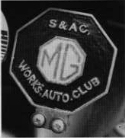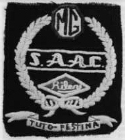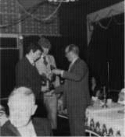We've often mentioned in these pages about the family spirit and the comradeship that existed at the MG factory in Abingdon-on-Thames. But did you know there was a thriving social scene among the employees with several different branches? The soccer team was one, the MG Caravan and Camping Club was another but for now we're going to take a look at the development of the MG Works Auto Club through the eyes of Brian Moylan who worked at the factory for nearly thirty years and was very involved in this particular section, as you will see.
Cecil Cousins could claim to have been the first person to work on an MG, a claim based on the fact that he turned the Bull-Nose Morris in which Cecil Kimber won his first awards in the London to Lands End Trial of 1923. He could also claim to have started the MG Social Club having suggested that he and his fellow workers should get together to buy a football to kick about in their dinner hour. From these humble beginnings a club grew.
A football (soccer) team was formed which played matches on the nearby Pavlova sports ground and soon a room was rented in Abingdon with a bar and billiards room. As more employees joined in, different activities were catered for, such as cricket, tennis, and rifle shooting, a sport in which a young John Thornley excelled!
During the war a clothing factory was purchased to store the car production material and after hostilities were over the building was handed over to the Social Club which by now had an official title - "The MG Social and Athletic Club". Employees had six pence per week deducted from their modest wages, if they wished to belong to the club. A committee of workers and management administered the club and its various sections were allocated funds to run activities for their members. Each individual section had a committee which was responsible for the organization of events for its own members.
In 1948, a group of enthusiastic motorcyclists organized an Auto Section and competed in some quite good motorcycle trials (mud plugging their way up the side of steep, usually wooded, hills.) Their enthusiasm was encouraged by John Thornley who donated a handsome trophy to be competed for in a trial organized by the Auto Section and sponsored by Avon Tires. It wasn't too long before competitive rallies were organized and gradually the men were able to afford motor cars. The number of motorcycling members decreased as the car-owning fraternity took over and autotests took the place of trials. John Thornley therefore gave permission for his trophy to be competed for as an Autotest Championship
Night rallies were a popular winter sport and were always well supported. At the height of their popularity some thirty plus motor cars would be getting lost in the country lanes of (then) Berkshire, with their drivers trying to maintain a 30 mph average speed. The climax of the season was a major rally for which the prize was the Ron Gibson Trophy.
Ron Gibson was the son of any Abingdon garage owner and way back in 1931 he had been a Brooklands race driver. He drove one of the MG C-Types in that year's Double Twelve race, in which MGs took the first five places! Ron and his co-driver brought their little Midget home in second place.
The garage was sold in the late 1940s and Ron came to work in the MG factory. He passed away in 1959 and his widow donated all his trophies to John Thornley to dispose of as he wished. The Auto Section of the club was the recipient of many of these fine trophies including the splendid silver rose bowl that Ron had won in that Brooklands Double Twelve, and this became the most cherished possession of the club.
In the late 1950s the Auto Section was thriving and affiliation to the Autocycle Union was dropped in favour of affiliation to the Royal Automobile Club (the RAC). Also dropped was the somewhat cumberstone title of the Auto Section of the MG Social and Athletic Club, in favour of the new title - The MG Works Auto Club.
I had joined the club when it was still the Auto Section, and soon the Chairman, who had held the position all through the motorcycling days retired, and I was suckered into the job!
The Auto Club continued to thrive. We organized an Autotest championship together with five other clubs in the Oxford area, and we also provided marshals for the prestigious International RAC Rally. By then I was employed in the Competitions Department at Abingdon and was able to obtain for the club a Morris Marina which had been used for development purposes and was due to be written off. We paid a nominal sum of £1.00 for it! It was for any member to use on National Rallies or Autocross and in addition to the car we were able, from the club's allocation of funds, to pay the entry fees to the events.
In this way some of our members gained experience of a better class of competition and quite a number who had started their motoring with us went on to obtain International Competition Licenses and took part in major rallies and races. One actually became a television star with his flamboyant style of driving in the televised rallycross series. Rallycross, by the way, was a sport especially devised for TV. The events were usually held at well-known race circuits using half the course, then cutting across the infield on grass (often quite wet and muddy!) Such events became a staple feature of Saturday afternoon sports programming on TV.
As time went by, we lost our Secretary and with nobody else willing to take on the task, I was unanimously elected to step in! I left the factory before it closed but was still allowed to sit on the club's committee. When the factory eventually closed we were left with a thriving organization, with our own collection of rare and valuable trophies, but we had always been financed by the Social Club. In addition, we had enjoyed the use of a modern clubhouse which had been built in 1960 on land with sufficient space for soccer and cricket pitches, tennis courts, even an indoor rifle range! We also enjoyed the use of the factory facilities. We frequently had need of equipment to be made in the Machine Shop or the Carpenter's shop. Photocopying was not so widely available as it is today but as I was on good terms with the Competition Manager's secretary, she printed all our committee meeting minutes and results using a stencil.
Suddenly with the factory closure we were without all of these facilities and were cast into the cruel world to fend for ourselves. Not entirely however - I approached a good friend who was on the Executive Council of the MG Car Club and between us we formulated a proposition that would enable us to become affiliated to the original MG Club. In fact, we were taken on as a sub-section of the Southwest Center. A year later we were allocated a whole slice of the center of Southern England to manage as a Center in our own right. However, in order to maintain our link with the old Works Club, we adopted the title of the Abingdon Works Center of the MG Car Club with our headquarters in Abingdon.
In 1987 the Center organized an International Weekend in Abingdon which was so successful that we were awarded the coveted Nuffield Gold Cup as the Center that had achieved a major achievement during the year. Now, here we are, still going strong in 1998. We still have the Ron Gibson Trophy, and the John Thornley Trophy is still competed for as an Autotest Championship. Sadly, most of the old factory workers have dropped out but we still have your honorary NAMGBR members, Don Hayter and Geoff Allen, as members, plus Mike Allison and several lesser mortals like myself who are all intent on maintaining that "special link."
 |
 |
 |
| The Abingdon works Social and Athletic Club car badge proudly adorns a Berkshire (Oxfordshire today) MG. | A blazer patch - "Tuto-Festina" means "All Hasten Forward". | John Thornley presenting an award in the Social Club Ballroom. |
Visit the NAMGBR pages
 Back to the News content
Back to the News content
![[Copyright/Credits]](../pics/mini-copyright.gif)
![[Home]](../pics/mini-home.gif)
![[Information]](../pics/mini-info.gif)
![[Feedback]](../pics/mini-mail.gif)